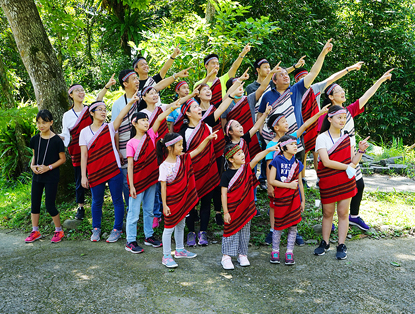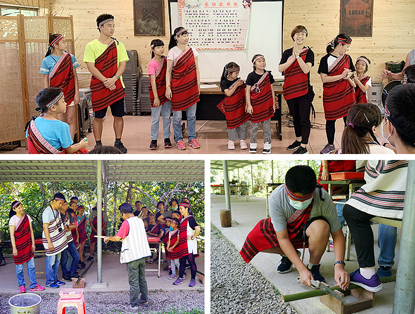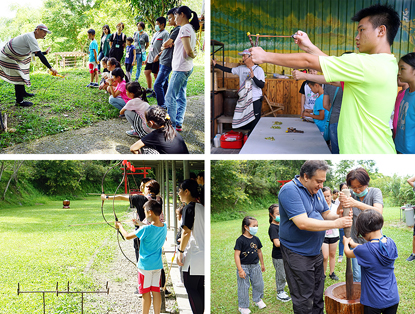Sketch of Archilife Study Tour, July 2020Date: 2020-08-25
Section: Activity |  7月份見識之旅活動,於2020年7月18日由呂明澐小姐帶領19位祐生見習生及家長們,進行烏來泰雅文化暨獵人生活體驗之旅。活動開始之初,領隊呂明澐小姐提醒本次活動注意事項及觀察重點,先行建立見習生的背景知識。 7月份見識之旅活動,於2020年7月18日由呂明澐小姐帶領19位祐生見習生及家長們,進行烏來泰雅文化暨獵人生活體驗之旅。活動開始之初,領隊呂明澐小姐提醒本次活動注意事項及觀察重點,先行建立見習生的背景知識。
For the study tour of July 18, 2020, Ms Lu Ming-yun led 19 ARF interns and their parents on a trip to Wulai to experience Atayal culture and a hunter's way of life. At the start of the day's activities, team leader Ms. Lu Ming-yun reminded everyone about things to note and what to observe, and gave the interns some background knowledge.
 本次行程以參訪位於烏來的泰雅巴萊部落村為主軸。活動之初,導覽老師施放原住民迎賓竹炮歡迎我方到來,隨後眾人換上泰雅傳統服飾開始一日行程。導覽老師首先教導泰雅歡樂歌與迎賓舞,驗收後於臉部畫上泰雅族紋面圖騰,作為一日泰雅人的認證。紋面傳統是泰雅文化非常重要的一環,通常在族內青年成年禮時進行,代表男子出草過敵人及狩獵有英勇表現、女子擅長織布與主理家事,是榮譽及責任的象徵。隨後開始竹筒飯DIY,竹筒飯是原住民獵人上山打獵時所攜帶的飯包,當天使用山上現砍的桂竹,由眾人輪流割下竹筒來製做自己的午餐主食。 本次行程以參訪位於烏來的泰雅巴萊部落村為主軸。活動之初,導覽老師施放原住民迎賓竹炮歡迎我方到來,隨後眾人換上泰雅傳統服飾開始一日行程。導覽老師首先教導泰雅歡樂歌與迎賓舞,驗收後於臉部畫上泰雅族紋面圖騰,作為一日泰雅人的認證。紋面傳統是泰雅文化非常重要的一環,通常在族內青年成年禮時進行,代表男子出草過敵人及狩獵有英勇表現、女子擅長織布與主理家事,是榮譽及責任的象徵。隨後開始竹筒飯DIY,竹筒飯是原住民獵人上山打獵時所攜帶的飯包,當天使用山上現砍的桂竹,由眾人輪流割下竹筒來製做自己的午餐主食。
The main focus of the tour was the Atayal Bale tribe village. The tour began with the tour guide setting off welcoming firecrackers and then everyone went to change into traditional Atayal costume for the tour. To be acknowledged as an Atayal for a day, everyone had to learn the Atayal song of joy and welcoming dance before their faces were painted with the Atayal facial tattoo. Facial tattoo is an important part of the Atayal culture. Normally it is done when a young person comes of age, symbolizing honor and responsibility. For males, it means they have taken the head of an enemy and shown valor as a hunter; and for females, it means they have mastered the skill of weaving and housekeeping. During the DIY session, everyone learned to make bamboo-tube rice. Bamboo-tube rice is the packed meal that the indigenous hunters bring with them when they go hunting. The bamboo tubes used that day were freshly cut from Makino bamboo plants in the mountain and were used to prepare the main course for lunch.
 飯後,進行捕獵常用工具解說,導覽老師透過動物頭骨模型介紹早期泰雅獵人主要狩獵目標,如山羌、山豬等,亦特別指出,在他們的狩獵傳統中,認為黑熊如同人一般的存在,獵熊將帶來厄運,因此通常不會獵熊。隨即至戶外講解小型陷阱的製做方法,並實際操作體驗。野外常用的陷阱主要為套頭陷阱及吊腳陷阱,前者為套住動物脖子,通常會直接死亡,適用於氣溫寒冷的冬天,以利獵物保存;後者會套住獵物的腿部,限制其行動,殺傷力較小,因此適合夏天或陷阱設置點較遠者。緊接著體驗彈弓射擊,彈弓在早期多用來射獵樹上的鳥類,屬原住民打獵器具之一,隨時代演進而成為許多家長孩提時代的玩具。接著進行原住民射箭體驗,由導覽老師教導眾人如何拿弓、拉弓及射箭技巧,見習生們都是第一次接觸,皆躍躍欲試。行程最後,進行泰雅祈福禮-搗麻糬體驗,搗麻糬是非常耗體力的事情,是以只有在部落迎賓、新居落成、結婚及豐收等特殊節日中進行,族人亦會將搗好的麻糬與左鄰右舍分享,代表分享生活的喜悅,原住民重視分享的傳統展露無疑。至此,本日活動已近尾聲,大家一起合照留念後搭車返程,並期待於下次見識之旅再相見。 飯後,進行捕獵常用工具解說,導覽老師透過動物頭骨模型介紹早期泰雅獵人主要狩獵目標,如山羌、山豬等,亦特別指出,在他們的狩獵傳統中,認為黑熊如同人一般的存在,獵熊將帶來厄運,因此通常不會獵熊。隨即至戶外講解小型陷阱的製做方法,並實際操作體驗。野外常用的陷阱主要為套頭陷阱及吊腳陷阱,前者為套住動物脖子,通常會直接死亡,適用於氣溫寒冷的冬天,以利獵物保存;後者會套住獵物的腿部,限制其行動,殺傷力較小,因此適合夏天或陷阱設置點較遠者。緊接著體驗彈弓射擊,彈弓在早期多用來射獵樹上的鳥類,屬原住民打獵器具之一,隨時代演進而成為許多家長孩提時代的玩具。接著進行原住民射箭體驗,由導覽老師教導眾人如何拿弓、拉弓及射箭技巧,見習生們都是第一次接觸,皆躍躍欲試。行程最後,進行泰雅祈福禮-搗麻糬體驗,搗麻糬是非常耗體力的事情,是以只有在部落迎賓、新居落成、結婚及豐收等特殊節日中進行,族人亦會將搗好的麻糬與左鄰右舍分享,代表分享生活的喜悅,原住民重視分享的傳統展露無疑。至此,本日活動已近尾聲,大家一起合照留念後搭車返程,並期待於下次見識之旅再相見。
After lunch, the tour guide explained the common tools used for hunting. Using models of animal skulls, the tour guide pointed out that Atayal hunters mainly hunted the Formosan Reeve's muntjac and boars in the early days. In particular, the hunters did not usually hunt bears as they believed that black bears existed like humans and hunting them would bring bad luck. The tour guide then took everyone outdoor to explain the making of small traps, including actual hands-on experience. Common traps used in the wild are mainly those that trap the head and those that hang the legs. The former traps the animal around the neck and usually cause instant death, and is suitable for use in cold winter as the dead animals can be easily preserved. The latter, on the other hand, traps the animal around the leg to restrict their movement but does not kill them, making it suitable for summer or when the trap is located far away. The next activity everyone participated in was catapult shooting. In the early days, the catapult was a hunting tool mostly used by the indigenous people to shoot down birds on the trees but as time goes by, it is now a toy many parents played with in their childhood. During the archery session, the tour guide taught everyone how to hold the bow, pull the bow back and shoot arrows. The interns were all excited to try it as it was their first experience with archery. At the end of the tour, everyone participated in the Atayal blessing ritual – pounding glutinous rice. As pounding glutinous rice is physically exerting, it is only done on special occasions, such as welcoming guests, celebrating the building of a new house, wedding and harvest. People in the tribe will share the pounded glutinous rice with their neighbors to spread their joy, which goes to show how much the indigenous people value sharing in their tradition. At this point, the day's itinerary came to an end. Everyone took a group photo before heading back and looked forward to the next study tour.
|
|